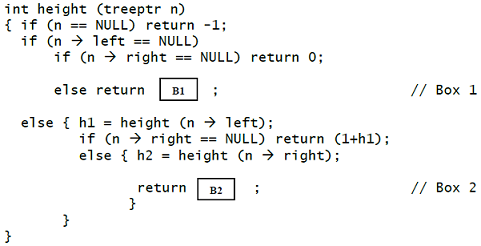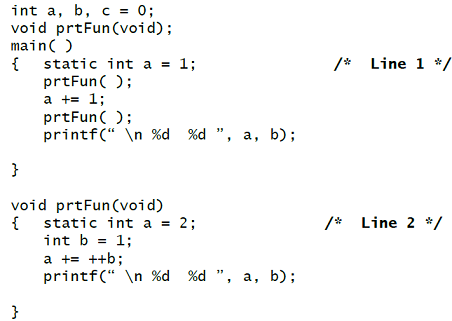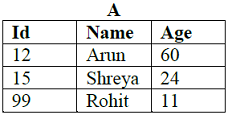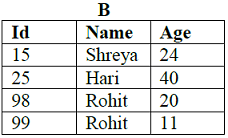GATE 2017-2018 :: GATE CSE
-
The height of a tree is defined as the number of edges on the longest path in the tree. The function shown in the pseudo code below is invoked as height(root) to compute the height of a binary tree rooted at the tree pointer root.
 The appropriate expressions for the two boxes B1 and B2 are
The appropriate expressions for the two boxes B1 and B2 are -
Consider the following C code segment.
 What output will be generated by the given code segment?
What output will be generated by the given code segment? -
Consider the following C code segment.
 What output will be generated by the given code segment if:Line 1 is replaced by auto int a = 1;Line 2 is replaced by register int a = 2;
What output will be generated by the given code segment if:Line 1 is replaced by auto int a = 1;Line 2 is replaced by register int a = 2; -
Consider the following relations A, B and C:


 How many tuples does the result of the following relational algebra expression contain? Assume that the schema of A∪B is the same as that of A.(A∪B) ⋈A.Id > 40 ᴠC.Id < 15 C
How many tuples does the result of the following relational algebra expression contain? Assume that the schema of A∪B is the same as that of A.(A∪B) ⋈A.Id > 40 ᴠC.Id < 15 C -
For the grammar below, a partial LL(1) parsing table is also presented along with the grammar. Entries that need to be filled are indicated as E1, E2, and E3. ε is the empty string, $ indicates end of input, and, | separates alternate right hand sides of productions.S → a A b B | b A a B | εA → SB → S
 The FIRST and FOLLOW sets for the non-terminals A and B are
The FIRST and FOLLOW sets for the non-terminals A and B are -
For the grammar below, a partial LL(1) parsing table is also presented along with the grammar. Entries that need to be filled are indicated as E1, E2, and E3. ε is the empty string, $ indicates end of input, and, | separates alternate right hand sides of productions.S → a A b B | b A a B | εA → SB → S
 The appropriate entries for E1, E2, and E3 are
The appropriate entries for E1, E2, and E3 are -
A computer has a 256 KByte, 4-way set associative, write back data cache with block size of 32 Bytes. The processor sends 32 bit addresses to the cache controller. Each cache tag directory entry contains, in addition to address tag, 2 valid bits, 1 modified bit and 1 replacement bit.The number of bits in the tag field of an address is
-
A computer has a 256 KByte, 4-way set associative, write back data cache with block size of 32 Bytes. The processor sends 32 bit addresses to the cache controller. Each cache tag directory entry contains, in addition to address tag, 2 valid bits, 1 modified bit and 1 replacement bit.The size of the cache tag directory is
- The cost function for a product in a firm is given by 5q2, where q is the amount of production. The firm can sell the product at a market price of Rs. 50 per unit. The number of units to be produced by the firm such that the profit is maximized is
-
Choose the most appropriate alternative from the options given below to complete the following sentence: Despite several “““““““““ the mission succeeded in its attempt to resolve the conflict.


 Whatsapp
Whatsapp
 Facebook
Facebook

